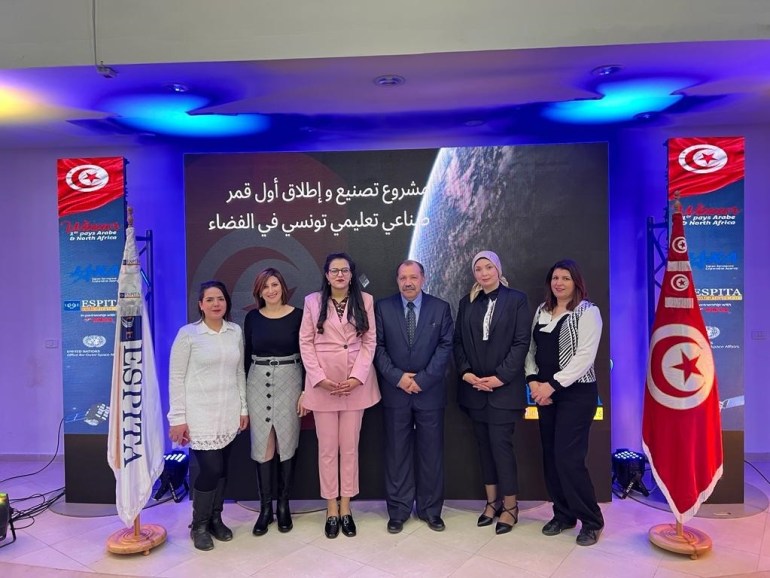An academic satellite project of the type "CubeSat" for a Tunisian scientific team won the International KiboCube competition in its sixth session, organized by the United Nations and the Japan Space Agency, and it was announced recently.
The Tunisian design, carried out by a group of students, engineers and researchers, for the first academic educational satellite in the country's history, "TUNSAT-1", achieved an unprecedented victory in North Africa and the Arab world in this competition, ahead of a large number of similar projects from more than 30 countries.
Kibokube is an international program launched in 2015 supervised by the United Nations Office for Outer Space Affairs (UNOOSA) and the Japan Aerospace Exploration Agency (JAXA), which provides the opportunity for the free launch of a "KubeSat" satellite into space from the International Space Station. .
The objective of this program is to enshrine the right of all countries in the world to peacefully exploit outer space in a sustainable manner in order to contribute to achieving their national interests and priorities.
Oweinat (third from left) and part of the Tunisian academic satellite project implementation team (Al-Jazeera)
The announcement by the United Nations of the victory of the Tunisian moon project, and a similar one from Mexico, came on Wednesday, February 16, from its headquarters in Vienna, on the sidelines of the annual meeting of the Committee for the Peaceful Exploitation of Outer Space (COPUOS).
As part of this program, Tunisia could launch its first educational satellite from the Japanese Experiment Unit "Kibo" on the International Space Station in 2023.
Capacity building first
According to the coordinator of the Tunisian Academic Satellite Project, Dr. Hana Oweinat - in an exclusive interview with Al Jazeera Net over the phone - the project, which was supervised by the Private School of Engineering and Applied Technology in Sousse in cooperation with the Tunisian Aerospace Association, "aims to contribute to building Tunisian capabilities in the field of space that serve national priorities." By providing an opportunity to work on the manufacture of a satellite.
The Tunisian researcher adds that the cooperation was based on the principle "Do not give me a fish, but teach me how to fish." .
Dr. Hana Owainat, speaking at the competition venue (Al Jazeera)
In an exclusive interview with Al Jazeera Net conducted on social media, Ahmed Al-Fadil, president of the Tunisian Aerospace Association, which supported the project with a number of engineers and researchers, said that it represents an "unprecedented opportunity for students and the academic sector to work on a space project."
He noted that "the absence of a space agency in Tunisia has left a huge void in building self-capabilities in the field of space technologies. Therefore, we support academic institutions in developing space projects with a primary motive that is to reduce inequality between countries in the field of space leadership and acquire the necessary technologies for that."
Al-Fadhel also stated that his association is currently working on a strategic goal of sending a probe into space before 2030, "Therefore, such projects represent the best way to gain experience in order to achieve this desired goal and introduce dynamism to the space sector in Tunisia."
next stages
After the Tunisia-Sat-1 satellite was manufactured in Tunisia by students of the Private School of Engineering and Applied Technology in Sousse and its partners, and the final tests were completed, the satellite will be launched next year on board a Japanese or American rocket under the supervision of the Japanese Space Agency towards the International Space Station at an altitude About 400 km above the earth's surface.
Then the moon will be separated from the international station using a robotic arm controlled by an astronaut from inside the station, before the Tunisian scientific team takes control of the satellite and communicates with it in space, thus launching the process of exploiting the data that it will send from space around Tunisia.
The satellite "Tunisia-Sat-1" will focus on Earth observation by acquiring macroscopic images of Tunisia, and a technical presentation by testing the communication between the satellite and the ground station.
Oweinat hopes that "the first academic satellite in Tunisia's history will be an incentive to encourage Tunisian engineers to innovate in the field of space and advanced technologies," noting that her academic institution will work, based on this project, to create a master's degree in space science and engineering to qualify the next generation of engineers who They will develop the domestic African space industry.

